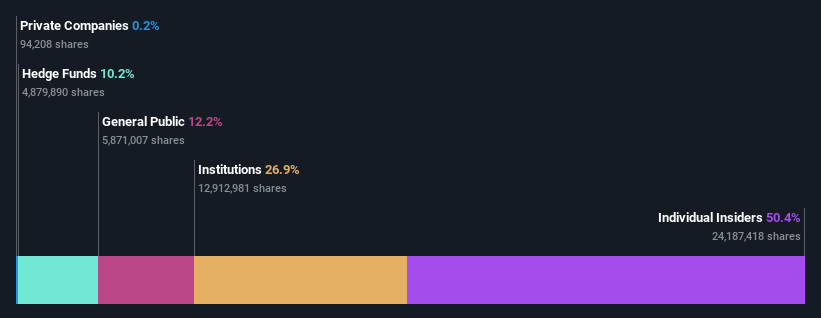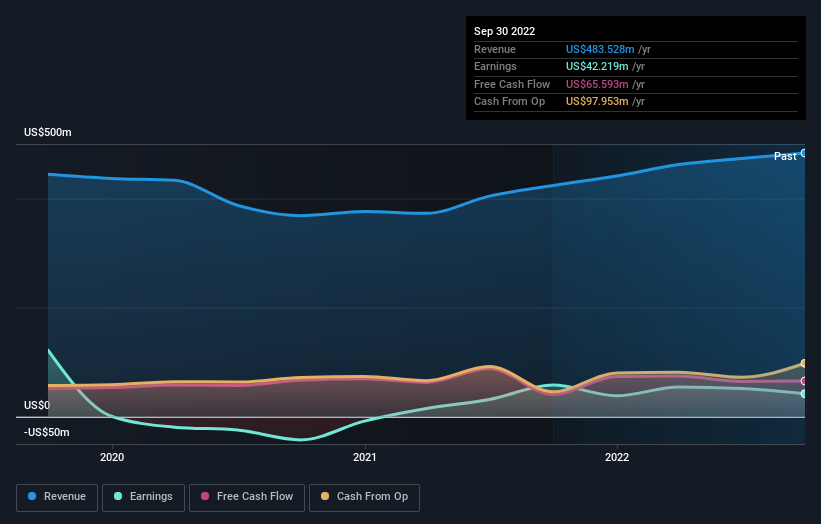- United States
- /
- Media
- /
- NasdaqCM:UONE.K
Insiders own 50% of Urban One, Inc. (NASDAQ:UONE.K) in spite of selling recently and the recent dip may have hurt them

If you want to know who really controls Urban One, Inc. (NASDAQ:UONE.K), then you'll have to look at the makeup of its share registry. And the group that holds the biggest piece of the pie are individual insiders with 50% ownership. In other words, the group stands to gain the most (or lose the most) from their investment into the company.
Even though insiders have sold shares recently, the group owns the most numbers of shares in the company. As a result, the group bore the brunt of last week’s US$30m market cap loss.
In the chart below, we zoom in on the different ownership groups of Urban One.
See our latest analysis for Urban One

What Does The Institutional Ownership Tell Us About Urban One?
Many institutions measure their performance against an index that approximates the local market. So they usually pay more attention to companies that are included in major indices.
We can see that Urban One does have institutional investors; and they hold a good portion of the company's stock. This can indicate that the company has a certain degree of credibility in the investment community. However, it is best to be wary of relying on the supposed validation that comes with institutional investors. They too, get it wrong sometimes. When multiple institutions own a stock, there's always a risk that they are in a 'crowded trade'. When such a trade goes wrong, multiple parties may compete to sell stock fast. This risk is higher in a company without a history of growth. You can see Urban One's historic earnings and revenue below, but keep in mind there's always more to the story.

It would appear that 10% of Urban One shares are controlled by hedge funds. That's interesting, because hedge funds can be quite active and activist. Many look for medium term catalysts that will drive the share price higher. Looking at our data, we can see that the largest shareholder is the CEO Alfred Liggins with 33% of shares outstanding. For context, the second largest shareholder holds about 14% of the shares outstanding, followed by an ownership of 10% by the third-largest shareholder. Interestingly, the second-largest shareholder, Catherine Hughes is also Top Key Executive, again, pointing towards strong insider ownership amongst the company's top shareholders.
After doing some more digging, we found that the top 3 shareholders collectively control more than half of the company's shares, implying that they have considerable power to influence the company's decisions.
While it makes sense to study institutional ownership data for a company, it also makes sense to study analyst sentiments to know which way the wind is blowing. Our information suggests that there isn't any analyst coverage of the stock, so it is probably little known.
Insider Ownership Of Urban One
While the precise definition of an insider can be subjective, almost everyone considers board members to be insiders. The company management answer to the board and the latter should represent the interests of shareholders. Notably, sometimes top-level managers are on the board themselves.
I generally consider insider ownership to be a good thing. However, on some occasions it makes it more difficult for other shareholders to hold the board accountable for decisions.
It seems that insiders own more than half the Urban One, Inc. stock. This gives them a lot of power. So they have a US$119m stake in this US$237m business. Most would be pleased to see the board is investing alongside them. You may wish todiscover (for free) if they have been buying or selling.
General Public Ownership
With a 12% ownership, the general public, mostly comprising of individual investors, have some degree of sway over Urban One. While this group can't necessarily call the shots, it can certainly have a real influence on how the company is run.
Next Steps:
While it is well worth considering the different groups that own a company, there are other factors that are even more important. For example, we've discovered 4 warning signs for Urban One (1 can't be ignored!) that you should be aware of before investing here.
Of course, you might find a fantastic investment by looking elsewhere. So take a peek at this free list of interesting companies.
NB: Figures in this article are calculated using data from the last twelve months, which refer to the 12-month period ending on the last date of the month the financial statement is dated. This may not be consistent with full year annual report figures.
New: AI Stock Screener & Alerts
Our new AI Stock Screener scans the market every day to uncover opportunities.
• Dividend Powerhouses (3%+ Yield)
• Undervalued Small Caps with Insider Buying
• High growth Tech and AI Companies
Or build your own from over 50 metrics.
Have feedback on this article? Concerned about the content? Get in touch with us directly. Alternatively, email editorial-team (at) simplywallst.com.
This article by Simply Wall St is general in nature. We provide commentary based on historical data and analyst forecasts only using an unbiased methodology and our articles are not intended to be financial advice. It does not constitute a recommendation to buy or sell any stock, and does not take account of your objectives, or your financial situation. We aim to bring you long-term focused analysis driven by fundamental data. Note that our analysis may not factor in the latest price-sensitive company announcements or qualitative material. Simply Wall St has no position in any stocks mentioned.
About NasdaqCM:UONE.K
Urban One
Operates as an urban-oriented multi-media company in the United States.
Good value slight.
Similar Companies
Market Insights
Community Narratives


